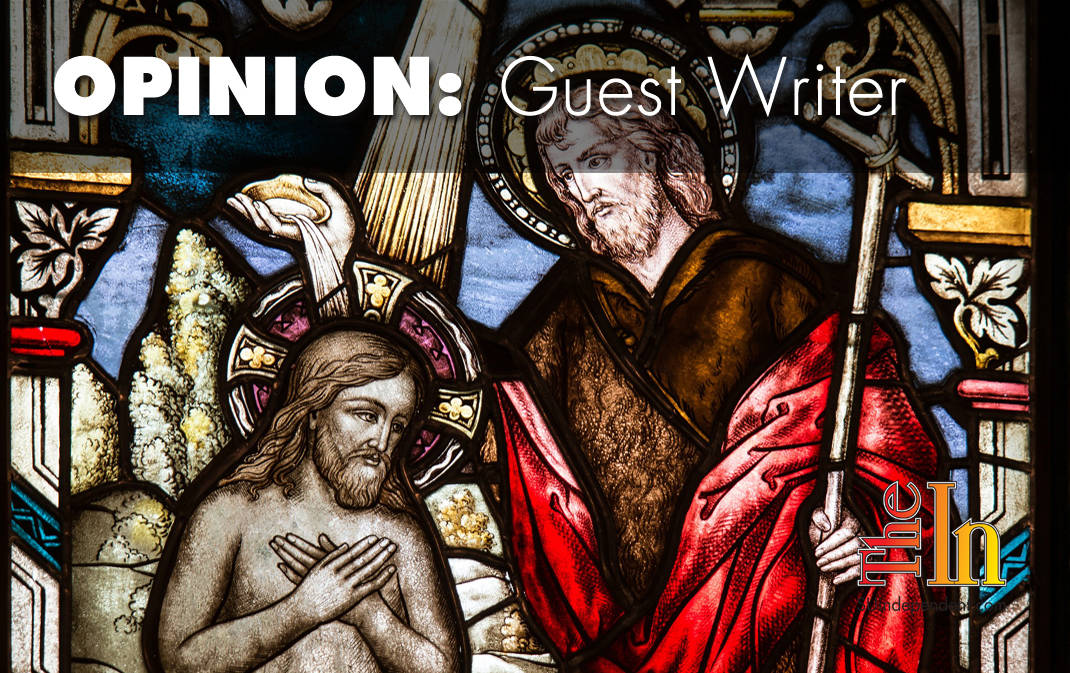 By Tom Garrison
By Tom Garrison
Many Americans claim the country as a “Christian” nation. While that has never been completely true, it was true enough to achieve the status of fairly well supported folklore. In fact, monotheism permeates our culture in many ways — some obvious and others not so obvious. Even nonbelievers share the milieu of religion-influenced culture. You probably don’t even notice all the subtle ways religion dominates everyday life.
Take, for example, the time-honored tradition of evoking God or God’s powers to confer disapproval or approbation.
Let’s look at swearing. A serious deity believer can say “God damn you” — an extremely powerful expletive. They are literally calling upon their god to place the object of their fury in an everlasting hell. Wow!
On the other hand, a serious atheist with the same emotional intensity might exclaim, “May your next hypothesis lack supporting evidence.” Not quite the same bite.
Or the ever popular “go to hell.” Another powerful invective conjuring fire and brimstone. The atheist equivalent, as best as I can come up with, is “May your car break down in Barstow in the middle of summer and replacement parts be not available.”
How about when offering condolences to someone suffering a potential or real loss? In that situation, we often hear the believer in God express their sympathy with a sincere “My prayers are with you.” They are telling the person that they will attempt to have their deity intervene and help.
The poor atheist, lacking a god to petition, may utter an equally sincere “My rational, science-based thoughts are with you” or “Peace and comfort to you.” The sincerity of the condolences may be the same in both cases, but which rings with more power?
One of my favorites is the blessing prior to a meal. For some believers, these are the opening lines for any meal, “God bless this meal.” An atheist, expressing gratitude might voice, “Let’s give thanks to the water, air, dirt, sunlight, photosynthesis, farmers, ranchers, truck drivers, grocery stores … for this food.” At least as correct as the believer’s blessing, but a bit wordy.
We have all heard the multipurpose “May God be with you” — appropriate for just about any situation. The nontheist equivalent goes something like, “May you fully understand and utilize the wisdom of Thomas Kuhn’s ‘The Structure of Scientific Revolutions.'”
Perhaps it is the specter of death which most separates the theists and atheists. A couple of lines from the excellent movie Hud (1963) sums up the difference:
After the family patriarch, Homer Bannon, dies and is buried, the preacher approaches Lonnie Bannon and says, “I know what you’re feeling my boy, but look at it this way: He’s gone to a better place.”
Lonnie replies, “I don’t think so … not unless dirt is a better place than air.”
However, in one important way, the schism between monotheists and atheists is illusory. Since the beginning of recorded history around 6,000 years ago, it is estimated by people who study such things that humans have worshiped at least 2,500 gods. The appeal to help from the god or gods has had a long time to permeate all human cultures. Atheists believe in zero gods, while monotheists believe in one. For the former, all 2,500 are false; for the latter, 2,499 are false. Not much difference.
So I’ll ask my monotheistic friends why their one god is the correct god. Are you then saying the claims for the other thousands are imaginary? That billions of people have worshiped false gods? How do you really know yours is not made up, too?
Regardless of the existence of God or not, I look forward to the time when atheists have been out of the closet and accepted as “normal” long enough so their sayings strongly compete with those of believers. (Assuming we atheists can produce some pithy and to-the-point expressions.) It will enrich our culture. Isn’t this real diversity?
For the sake of disclosure, I should mention my mixed marriage. I have been an atheist since teenage years, Deb, my wife of 34 years, has been a good Methodist for longer than my atheism. We believe our two cats, Dave and Molly, are followers of Bastet, the Egyptian cat god.
Tom Garrison is retired and enjoying libertarian life in St. George, Utah with his wife Deb and two cats. His latest book, “Hiking Southwest Utah and Adjacent Areas, Volume One,” is available at all estores, the Zion National Park Visitor Center, and the Desert Rat store in St. George. Contact him at tomgarrison98@yahoo.com.







“…we often hear the believer in God express their sympathy with a sincere “My prayers are with you.” They are telling the person that they will attempt to have their deity intervene and help.”
Yes, it must be a great comfort to have someone express sympathy by invoking the aid of their invisible friend, especially when experiments have shown that prayer does not work – ever.
I prefer the atheist response, which is to either give actual help, or to give sympathy based in reality.
“We have all heard the multipurpose “May God be with you” — appropriate for just about any situation.”
It’s absolutely not appropriate when talking to an atheist, who would think such a greeting would be at best meaningless, at worst childish and presumptuous.
“The nontheist equivalent goes something like, “May you fully understand and utilize the wisdom of Thomas Kuhn’s ‘The Structure of Scientific Revolutions.’””
I’m not sure why the atheist should not use the simple everyday phrase “Have a nice day.”
“… experiments have shown that prayer does not work – ever.” Ever! Wow! Quite a bold statement, isn’t that?
“Ever! Wow! Quite a bold statement, isn’t that?” No, not bold at all, it is a true statement, devoid of emotion.
A bold statement that has yet to be supported with the irrefutable proof necessary to qualify it as fact. Still waiting.
I truly envy my non-atheist friends. How comforting to believe that a better life exists after this. But, try as I might, Lonnie just makes more sense. If someone wants to wish the best of their God for me, though, I am fine with that. And, as they say, there are no atheists in a foxhole.
But there certainly are atheists in foxholes – literally. Many atheists have served with distinction in the military and have not turned to an imaginary god in times of crisis – I imagine they were too busy relying on their brains and skills to survive – you know, stuff that actually works.
Very nice piece. Thank you for sharing your thoughts.